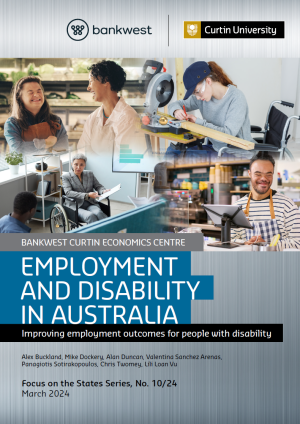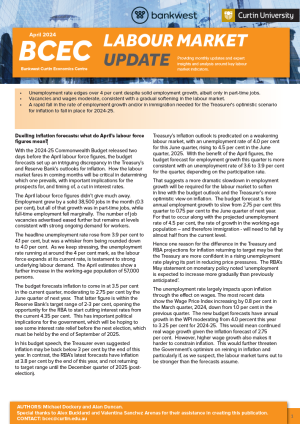Publications
The potential implications of autonomous vehicles for active transport
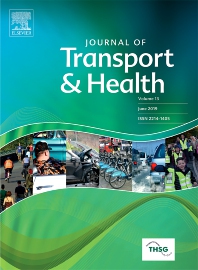 Active transport (e.g., walking, cycling, and public transport) is associated with numerous health benefits and is the most environmentally sustainable means of personal transport. The introduction of autonomous vehicles (AVs) is expected to result in wide-scale changes to active transport... Read article
Active transport (e.g., walking, cycling, and public transport) is associated with numerous health benefits and is the most environmentally sustainable means of personal transport. The introduction of autonomous vehicles (AVs) is expected to result in wide-scale changes to active transport... Read article
 Active transport (e.g., walking, cycling, and public transport) is associated with numerous health benefits and is the most environmentally sustainable means of personal transport. The introduction of autonomous vehicles (AVs) is expected to result in wide-scale changes to active transport... Read article
Active transport (e.g., walking, cycling, and public transport) is associated with numerous health benefits and is the most environmentally sustainable means of personal transport. The introduction of autonomous vehicles (AVs) is expected to result in wide-scale changes to active transport... Read article
Mortgage stress and precarious home ownership
 Between 1987 and 2015, the growth in mortgage debt outstripped both house price and income growth among older mortgagors (55+). Mortgage debt blew out by 600 per cent while house prices tripled. Income growth lagged even further behind, doubling over... Read article
Between 1987 and 2015, the growth in mortgage debt outstripped both house price and income growth among older mortgagors (55+). Mortgage debt blew out by 600 per cent while house prices tripled. Income growth lagged even further behind, doubling over... Read article
 Between 1987 and 2015, the growth in mortgage debt outstripped both house price and income growth among older mortgagors (55+). Mortgage debt blew out by 600 per cent while house prices tripled. Income growth lagged even further behind, doubling over... Read article
Between 1987 and 2015, the growth in mortgage debt outstripped both house price and income growth among older mortgagors (55+). Mortgage debt blew out by 600 per cent while house prices tripled. Income growth lagged even further behind, doubling over... Read article
Better together: Supporting perinatal and infant mental health services
 The project maps how services in the cities of Wanneroo/Joondalup interact to enhance the quality of perinatal and infant mental health services for the community. Service providers were invited to work with the research team over 12 months to design,... Read article
The project maps how services in the cities of Wanneroo/Joondalup interact to enhance the quality of perinatal and infant mental health services for the community. Service providers were invited to work with the research team over 12 months to design,... Read article
 The project maps how services in the cities of Wanneroo/Joondalup interact to enhance the quality of perinatal and infant mental health services for the community. Service providers were invited to work with the research team over 12 months to design,... Read article
The project maps how services in the cities of Wanneroo/Joondalup interact to enhance the quality of perinatal and infant mental health services for the community. Service providers were invited to work with the research team over 12 months to design,... Read article
The decades-long dispute over scale effects in the Theory of Economic Growth
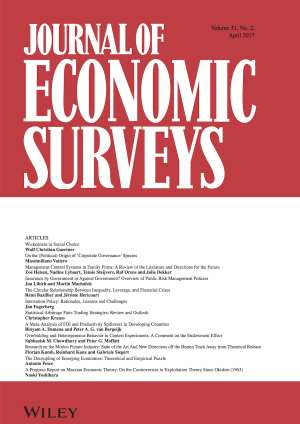 The so‐called “new growth theory” is characterized by the now Nobel Prize winning insight that ideas are a nonrival input to and output from endogenous investment in innovation. Nonrivalry implies increasing returns to scale, but this also unintentionally creates an... Read article
The so‐called “new growth theory” is characterized by the now Nobel Prize winning insight that ideas are a nonrival input to and output from endogenous investment in innovation. Nonrivalry implies increasing returns to scale, but this also unintentionally creates an... Read article
 The so‐called “new growth theory” is characterized by the now Nobel Prize winning insight that ideas are a nonrival input to and output from endogenous investment in innovation. Nonrivalry implies increasing returns to scale, but this also unintentionally creates an... Read article
The so‐called “new growth theory” is characterized by the now Nobel Prize winning insight that ideas are a nonrival input to and output from endogenous investment in innovation. Nonrivalry implies increasing returns to scale, but this also unintentionally creates an... Read article
Governance, democracy and development
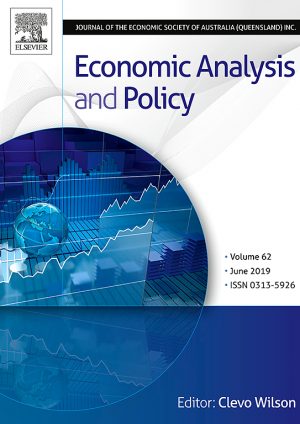 While it is obvious that the level of democracy will affect the quality of governance, we show that an electoral democracy should not be expected to have an improved level of governance when compared with an outright authoritarian regime. We... Read article
While it is obvious that the level of democracy will affect the quality of governance, we show that an electoral democracy should not be expected to have an improved level of governance when compared with an outright authoritarian regime. We... Read article
 While it is obvious that the level of democracy will affect the quality of governance, we show that an electoral democracy should not be expected to have an improved level of governance when compared with an outright authoritarian regime. We... Read article
While it is obvious that the level of democracy will affect the quality of governance, we show that an electoral democracy should not be expected to have an improved level of governance when compared with an outright authoritarian regime. We... Read article
BCEC Quarterly Economic Commentary – June 2019
 This Western Australia Quarterly Economic Commentary analyses the most recent data on economic and social indicators for WA, as at Q2 2019. This quarter we see that falling private sector investment continues to drag the WA economy into negative growth territory,... Read article
This Western Australia Quarterly Economic Commentary analyses the most recent data on economic and social indicators for WA, as at Q2 2019. This quarter we see that falling private sector investment continues to drag the WA economy into negative growth territory,... Read article
 This Western Australia Quarterly Economic Commentary analyses the most recent data on economic and social indicators for WA, as at Q2 2019. This quarter we see that falling private sector investment continues to drag the WA economy into negative growth territory,... Read article
This Western Australia Quarterly Economic Commentary analyses the most recent data on economic and social indicators for WA, as at Q2 2019. This quarter we see that falling private sector investment continues to drag the WA economy into negative growth territory,... Read article
Labour market implications of promoting women’s participation in STEM in Australia
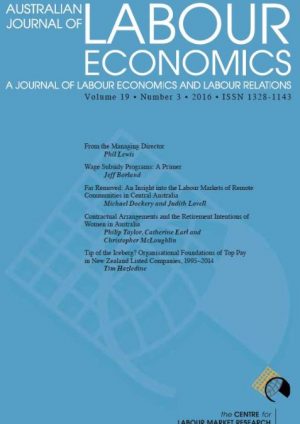 It is commonly argued that maintaining and enhancing Australia’s standard of living will require increasing the proportion of the population attaining university level qualifications in science, technology, engineering and mathematics (STEM). Accordingly, governments and universities have been proactive in encouraging... Read article
It is commonly argued that maintaining and enhancing Australia’s standard of living will require increasing the proportion of the population attaining university level qualifications in science, technology, engineering and mathematics (STEM). Accordingly, governments and universities have been proactive in encouraging... Read article
 It is commonly argued that maintaining and enhancing Australia’s standard of living will require increasing the proportion of the population attaining university level qualifications in science, technology, engineering and mathematics (STEM). Accordingly, governments and universities have been proactive in encouraging... Read article
It is commonly argued that maintaining and enhancing Australia’s standard of living will require increasing the proportion of the population attaining university level qualifications in science, technology, engineering and mathematics (STEM). Accordingly, governments and universities have been proactive in encouraging... Read article
Getting our house in order?
 This report by the Bankwest Curtin Economics Centre focuses on housing affordability, one of the most important economic and social issues facing Western Australia, and indeed the country. This twelfth report in BCEC’s Focus on WA series builds on the Centre’s earlier... Read article
This report by the Bankwest Curtin Economics Centre focuses on housing affordability, one of the most important economic and social issues facing Western Australia, and indeed the country. This twelfth report in BCEC’s Focus on WA series builds on the Centre’s earlier... Read article
 This report by the Bankwest Curtin Economics Centre focuses on housing affordability, one of the most important economic and social issues facing Western Australia, and indeed the country. This twelfth report in BCEC’s Focus on WA series builds on the Centre’s earlier... Read article
This report by the Bankwest Curtin Economics Centre focuses on housing affordability, one of the most important economic and social issues facing Western Australia, and indeed the country. This twelfth report in BCEC’s Focus on WA series builds on the Centre’s earlier... Read article
BCEC Newsletter Autumn 2019 Edition
 Welcome to the Autumn 2019 edition of the BCEC tri-annual newsletter. The issue of gender pay equity is an ongoing focus for the Centre, and one of the highlights of our research and engagement program for the first half of... Read article
Welcome to the Autumn 2019 edition of the BCEC tri-annual newsletter. The issue of gender pay equity is an ongoing focus for the Centre, and one of the highlights of our research and engagement program for the first half of... Read article
 Welcome to the Autumn 2019 edition of the BCEC tri-annual newsletter. The issue of gender pay equity is an ongoing focus for the Centre, and one of the highlights of our research and engagement program for the first half of... Read article
Welcome to the Autumn 2019 edition of the BCEC tri-annual newsletter. The issue of gender pay equity is an ongoing focus for the Centre, and one of the highlights of our research and engagement program for the first half of... Read article
Dimensions of attitudes to autonomous vehicles
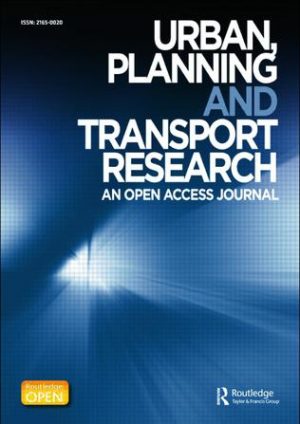 For the benefits of autonomous vehicles (AVs) to be optimized, the fleet conversion process needs to be efficient and timely. This study explored public attitudes to AVs to inform strategies to increase receptivity to the wide-scale use of AVs. A... Read article
For the benefits of autonomous vehicles (AVs) to be optimized, the fleet conversion process needs to be efficient and timely. This study explored public attitudes to AVs to inform strategies to increase receptivity to the wide-scale use of AVs. A... Read article
 For the benefits of autonomous vehicles (AVs) to be optimized, the fleet conversion process needs to be efficient and timely. This study explored public attitudes to AVs to inform strategies to increase receptivity to the wide-scale use of AVs. A... Read article
For the benefits of autonomous vehicles (AVs) to be optimized, the fleet conversion process needs to be efficient and timely. This study explored public attitudes to AVs to inform strategies to increase receptivity to the wide-scale use of AVs. A... Read article
BCEC Quarterly Economic Commentary – March 2019
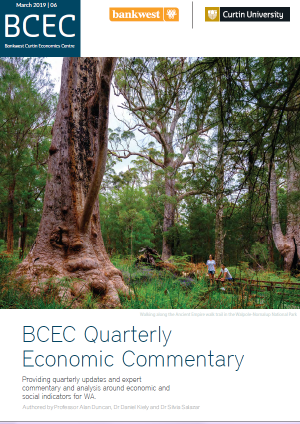 – Fragility lingers for the WA economy – – Show me the money: Wage growth a key culprit for sluggish household consumption growth – – Dwelling approvals improve – but all else is not equal in the housing sector – This Western... Read article
– Fragility lingers for the WA economy – – Show me the money: Wage growth a key culprit for sluggish household consumption growth – – Dwelling approvals improve – but all else is not equal in the housing sector – This Western... Read article
 – Fragility lingers for the WA economy – – Show me the money: Wage growth a key culprit for sluggish household consumption growth – – Dwelling approvals improve – but all else is not equal in the housing sector – This Western... Read article
– Fragility lingers for the WA economy – – Show me the money: Wage growth a key culprit for sluggish household consumption growth – – Dwelling approvals improve – but all else is not equal in the housing sector – This Western... Read article
Culture, migration and educational performance: a focus on gender outcomes using Australian PISA tests
 This paper explores how cultural and migrant backgrounds affect boys’ and girls’ high-school academic performance. Scores from the 2015 Programme for International Student Assessment are analysed for Australian children from migrant and non-migrant families, conditional upon a measure of gender... Read article
This paper explores how cultural and migrant backgrounds affect boys’ and girls’ high-school academic performance. Scores from the 2015 Programme for International Student Assessment are analysed for Australian children from migrant and non-migrant families, conditional upon a measure of gender... Read article
 This paper explores how cultural and migrant backgrounds affect boys’ and girls’ high-school academic performance. Scores from the 2015 Programme for International Student Assessment are analysed for Australian children from migrant and non-migrant families, conditional upon a measure of gender... Read article
This paper explores how cultural and migrant backgrounds affect boys’ and girls’ high-school academic performance. Scores from the 2015 Programme for International Student Assessment are analysed for Australian children from migrant and non-migrant families, conditional upon a measure of gender... Read article

